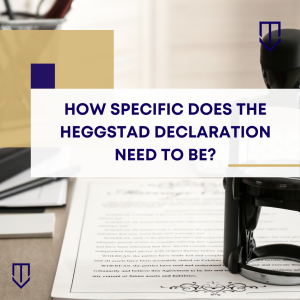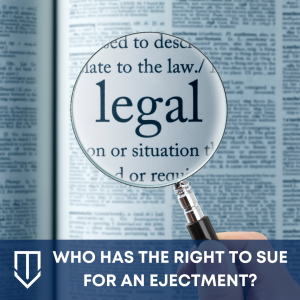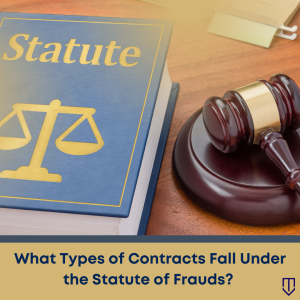 A Heggstad petition is a unique legal maneuver in probate court that a party can use to establish the existence of a trust. Normally, if a party wants to show that the property at issue is in a family trust, they have to produce evidence of a transfer of the property into the trust. (Prob. Code § 15200 (b).) This is usually accomplished with a deed, which conveys the property from the owners (the “settlors”) to the trustees of the trust.
A Heggstad petition is a unique legal maneuver in probate court that a party can use to establish the existence of a trust. Normally, if a party wants to show that the property at issue is in a family trust, they have to produce evidence of a transfer of the property into the trust. (Prob. Code § 15200 (b).) This is usually accomplished with a deed, which conveys the property from the owners (the “settlors”) to the trustees of the trust.
But what happens when the settlor and trustee are the same person? That’s where Heggstad comes in. Under Heggstad, no formal transfer of the property by deed is needed. Instead, a written declaration of trust by the owner of the property is enough, provided the owner names themself as the sole trustee. (Carne v. Worthington (2016) 246 Cal.App.4th 548, 559.)
Nonetheless, a successful Heggstad petition still requires proper planning and execution. A faulty property description, for instance, can doom the action from the outset. At Underwood Law firm, our attorneys know how tough a situation like this can be. Thankfully, our attorneys are well-versed in estate planning, and we know the best ways to tackle the disputes that accompany property in probate. Our team has the legal acumen and skills necessary to help you achieve your litigation goals.
 California Partition Law Blog
California Partition Law Blog


 A deed of trust is a commonly used mortgage document in California. Essentially, a deed of trust provides a lender with security for the repayment of the loan and effectively functions
A deed of trust is a commonly used mortgage document in California. Essentially, a deed of trust provides a lender with security for the repayment of the loan and effectively functions  In California, property subject to a trust can be partitioned, though with some additional wrinkles to the regular partition process. Because trusts can often involve successive estates with future and present property interests, litigants should take care to understand the law regarding trusts before beginning such an action.
In California, property subject to a trust can be partitioned, though with some additional wrinkles to the regular partition process. Because trusts can often involve successive estates with future and present property interests, litigants should take care to understand the law regarding trusts before beginning such an action.  Ejectment is an action brought by a party seeking to recover a possessory interest or claim of title in a piece of real property. Typically, an ejectment action arises when a titleholder to a piece of property has been wrongfully excluded or withheld from the property. Therefore, ejectment applies only to those cases where an individual actually has possessory title to the subject property.
Ejectment is an action brought by a party seeking to recover a possessory interest or claim of title in a piece of real property. Typically, an ejectment action arises when a titleholder to a piece of property has been wrongfully excluded or withheld from the property. Therefore, ejectment applies only to those cases where an individual actually has possessory title to the subject property. “Joint tenancy” is a phrase that most people associate with the co-ownership of a property. And indeed, this is correct. Joint tenancy is a form of co-ownership in California, second only to
“Joint tenancy” is a phrase that most people associate with the co-ownership of a property. And indeed, this is correct. Joint tenancy is a form of co-ownership in California, second only to In most breach of contract actions, the court must find that a valid contract has been created. There are several requirements that need to be fulfilled in order to have an enforceable contract. In certain circumstances, evidence of the existence of a contract in writing is required for the contract to be valid.
In most breach of contract actions, the court must find that a valid contract has been created. There are several requirements that need to be fulfilled in order to have an enforceable contract. In certain circumstances, evidence of the existence of a contract in writing is required for the contract to be valid. The deed to a property is the most important document a property owner has. It describes the title and its associated rights while operating as the conveyance of property itself. For that reason, the law presumes the validity of deeds without defects on their face. But that does not mean that every deed is legally valid and not subject to cancellation.
The deed to a property is the most important document a property owner has. It describes the title and its associated rights while operating as the conveyance of property itself. For that reason, the law presumes the validity of deeds without defects on their face. But that does not mean that every deed is legally valid and not subject to cancellation. An escrow is a tool used in
An escrow is a tool used in  A lis pendens – also called a notice of pendency of action – is a special type of legal document filed with a county recorder. Though its use is limited to lawsuits involving real property claims, its effect is powerful. Once recorded, it acts as “constructive notice” to all persons who would subsequently acquire an interest in the property at issue that a lawsuit is occurring.
A lis pendens – also called a notice of pendency of action – is a special type of legal document filed with a county recorder. Though its use is limited to lawsuits involving real property claims, its effect is powerful. Once recorded, it acts as “constructive notice” to all persons who would subsequently acquire an interest in the property at issue that a lawsuit is occurring. The
The